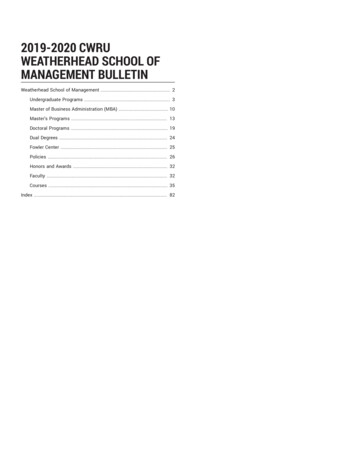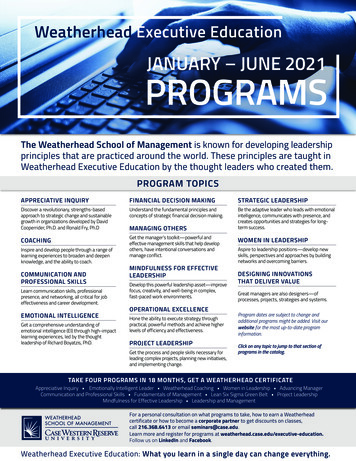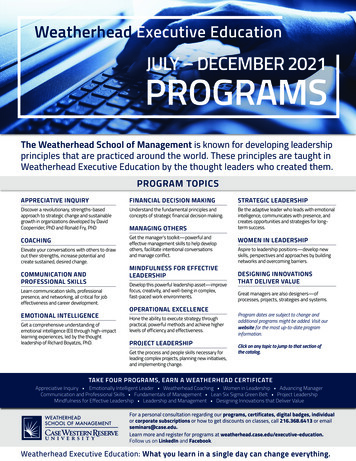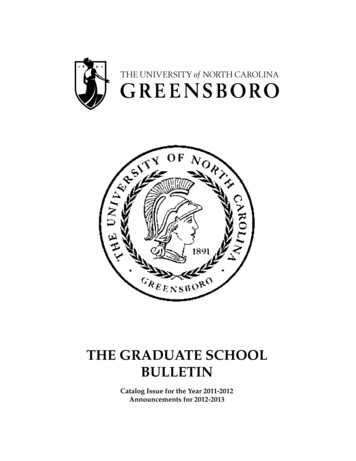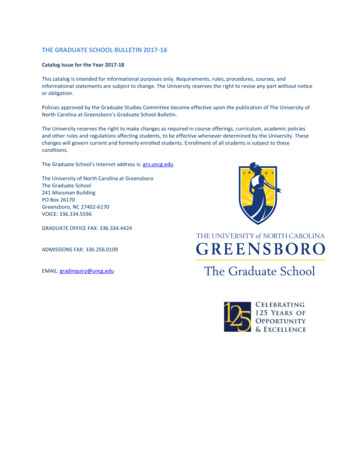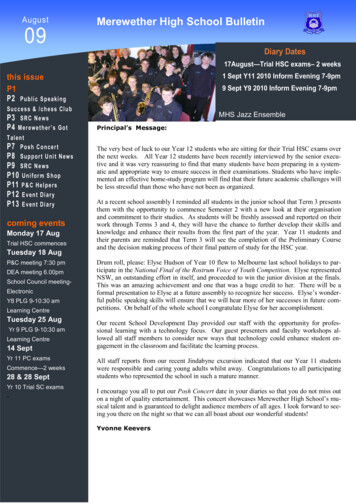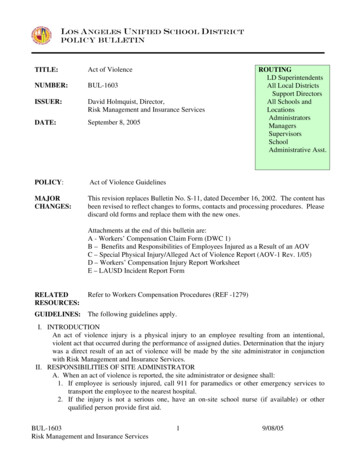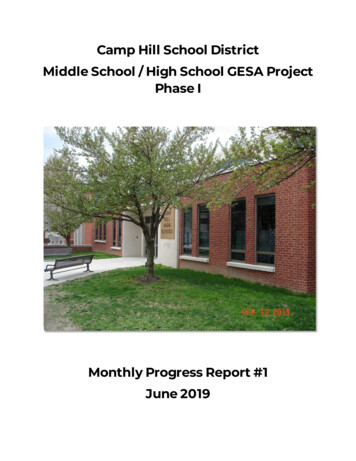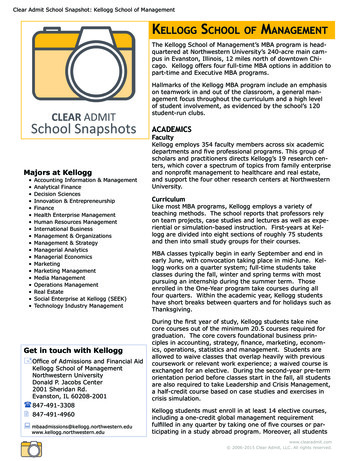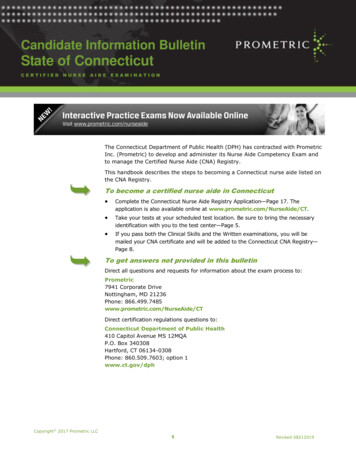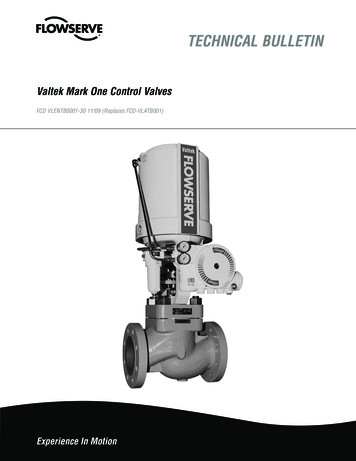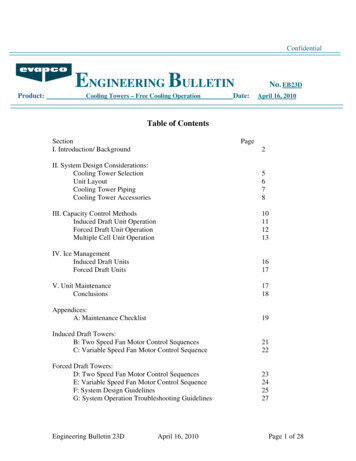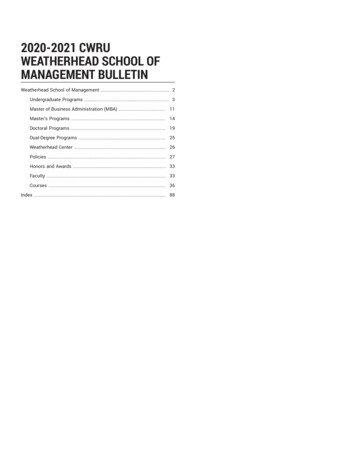
Transcription
2020-2021 CWRUWEATHERHEAD SCHOOL OFMANAGEMENT BULLETINWeatherhead School of Management . 2Undergraduate Programs . 3Master of Business Administration (MBA) . 11Master's Programs . 14Doctoral Programs . 19Dual-Degree Programs . 25Weatherhead Center . 26Policies . 27Honors and Awards . 33Faculty . 33Courses . 36Index . 88
2Weatherhead School of ManagementWEATHERHEAD SCHOOL OFMANAGEMENTPeter B. Lewis Buildinghttp://weatherhead.case.edu/Phone: 216.368.2030Weatherhead School of Management spans the entire spectrumof research and learning from Appreciative Inquiry (AI) to ArtificialIntelligence (AI). Weatherhead's more than 1,400 students studyundergraduate, graduate and doctoral programs in the Peter B. LewisBuilding. Weatherhead's Executive Education programs engage morethan 3,000 people annually and offer the latest in leadership developmentprograms to help individuals at all stages of their careers grow in theirprofession. Our Fowler Center for Business as an Agent of World Benefitbrings students together with an international network of educators,researchers and practitioners who incorporate social and global issuesinto business innovation and social entrepreneurship.Through innovative curriculum in data-driven management, Weatherheadcontinues to position graduates for high-demand jobs that connectbusiness with analytics and technology in a rapidly changing world.STEM Masters degrees for MBA, Accounting, Business Analytics, Financeand Operations Research/Supply Chain immerse students with indemand technical knowledge, such as big data, artificial intelligence andblockchain technology, that is essential for a competitive business career.As a management school within a top research university, Weatherhead'sfaculty members are committed to expanding knowledge andcontributing to global scholarship through their research. Weatherheadfaculty pioneered concepts in Appreciative Inquiry, Emotional Intelligencecompetencies, Intentional Change Theory and Manage by Designing. Ourfaculty have extensive, real-world business experience and connectionsto business leaders which they leverage to help students learn anddevelop networks. Students have unique opportunities to work closelywith our world-class faculty members.Mission StatementThe Weatherhead School of Management has an enduring impact onbusiness and society through cutting edge research and innovativeteaching that prepares professionals for the marketplace of the future.VisionThe Weatherhead School of Management is a leader in data driven,experiential, and market-based management education and research. Weleverage our strengths from Appreciative Inquiry to Artificial Intelligence(AI to AI), empowering our graduates to solve complex problems and leadthriving organizations that do well by doing good.ValuesThe Weatherhead School of Management proudly embraces our studentcentered culture of excellence that promotes collaboration, inclusion, anddiversity in all that we do. Student-Centered – We believe in our students and alumni being ourtrue north, and promote their development, growth, and well-being. Excellence with Integrity– We act ethically and transparently withall our internal and external stakeholders to promote and reward aculture of inquiry and discovery that is driven by evidence-basedinnovation in our research, in our classroom experience, and in ourcommunity endeavors. Collaboration in Action –We act collegially within our WSOMcommunity, the University, and with external partners to developenduring and transformational knowledge across disciplines. Diversity with Inclusion – We value diversity of ideas, culture, andpeople to foster an inclusive, respectful, and supportive community oflifelong learners.Brief HistoryIn 1952, Western Reserve University established the School of Businessby combining the Cleveland College Division of Business Administrationand the Graduate School Division of Business Administration, and fromits founding until 1988, the activities of the School of Business weredivided among a number of buildings both in downtown Cleveland andin University Circle. In 1967, the merger of Case Institute of Technologyand Western Reserve University created Case Western ReserveUniversity, and the Western Reserve University School of Businessabsorbed Case’s Division of Organizational Sciences to become theSchool of Management in 1970. Just six years later, the School ofManagement launched its full-time MBA.In 1980, the School of Management was renamed in honor of AlbertJ. Weatherhead III, a Cleveland businessman and industrialist whorepresented the fourth generation of his family to carry on theWeatherhead name and values, including cultural and educationalleadership. By 1999, the Weatherhead School of Management haddeveloped a strong identity, growing out of its space in Enterprise Halland requiring new construction. Funded by the philanthropist andentrepreneur whose name it bears, the Peter B. Lewis building, designedby renowned contemporary architect Frank Gehry and completed in 2002,was the answer. Located across the street from the George S. DivelyBuilding, which houses Weatherhead Executive Education programs,the Lewis Building, featuring Gehry’s unmistakable sculptural profileand gleaming stainless steel roof, both sets the school apart from itssurroundings and, quite literally, reflects the prestigious neighborhood ofthe school. Gehry redefined the way a business school should look, justas Weatherhead redefines the way management education should takeplace.AccreditationThe programs of the Weatherhead School of Management have been fullyaccredited by the Association to Advance Collegiate Schools of Business(AACSB) International since 1958.AdministrationManoj K. Malhotra, PhD(Ohio State University)Dean, Weatherhead School of Management; Albert J. Weatherhead IIIProfessor of Management; Professor, OperationsGregory Jonas, PhD, CMA(Virginia Commonwealth University)Senior Associate Dean, Academics and Graduate Programs; AssociateProfessor, AccountancyLeonardo Madureira, PhD(University of Pennsylvania)Associate Dean, Research and Faculty; Deborah and David Daberko Fellow;Professor, Banking and Finance
Management1. Business Management with one or moreconcentration(s) in:a. Business InformationTechnologyJennifer Johnson, MBAAssociate Dean, Undergraduate and Integrated Programs; AssociateProfessor, Design & InnovationSharon Martin, MBA, CPAAssociate Dean, Finance and Administration; Associate Professor,Accountancyb. Healthcare Managementc. Innovation & Entrepreneurshipd. International BusinessShirley Leonard, MBAAssociate Dean, External Relationse. Organizational Leadershipf. Supply Chain Management2. FinanceJim Hurley, MEd, MSEdAssistant Dean, Undergraduate and Integrated ProgramsTiffany Schwendeman, MAcc, MBAAssistant Dean, Curriculum and Administration, Master of AccountancyDeborah Bibb, MBAExecutive Director Enrollment, Career Development and Student ExperienceAnna Frolova-Levi, MBAExecutive Director, Recruitment and PlacementChristine Kush, MBA, MPAExecutive Director, Executive EducationDepartment ChairsDiana Bilimoria, PhD(University of Michigan)KeyBank Professor; Chair and Professor, Organizational BehaviorCNV Krishnan, PhD(University of Wisconsin-Madison)Chair and Professor, Banking and Finance; Faculty Director, MSM-FinanceKalle Lyytinen, PhD(University of Jyvaskyla)Distinguished University Professor; Iris S. Wolstein Professor of ManagementDesign; Faculty Director, DM Program; Chair and Professor, Design &InnovationKamlesh Mathur, PhD(Case Western Reserve University)Chair and Professor, Operations; Faculty Co-director, MSM-BusinessAnalytics; Faculty Co-director, Master of Engineering and ManagementThomas King, DM, CPA, CMA(Case Western Reserve University)Chair and Professor, Accountancy; Faculty Director, Master of AccountancyMark Votruba, PhD(Princeton University)Chair and Associate Professor, Economics; Faculty Director, MSM-HealthcareUndergraduate ProgramsDEGREES AND MAJORSBS AccountingBA EconomicsBS Management with Major(s) in:33. Marketing4. Dean’s ApprovedBachelor of Science (BS) in AccountingThe accounting profession demands a high degree of technicaltraining, similar to the professions of architecture, law, engineering andmedicine, and a broad knowledge of the fundamentals of economics andbusiness with a commitment to public well-being. Career opportunitiesin accounting include the public, corporate, government, nonprofitand healthcare sectors. The undergraduate program in accountancyis designed to prepare students for entrance into these careersand to provide a foundation for the examination to become a CPAor to achieve other professional certifications. Each state Board ofAccountancy (https://www.nasba.org/stateboards/) has its owneligibility requirements for taking the CPA exam. Students pursuing aBS in Accounting should consult the Board of Accountancy (https://www.nasba.org/stateboards/) website for the state in which they planto sit for the CPA examination in order to determine specific courserequirements.As part of the sequence of courses leading to the BS in Accountingoffered through Weatherhead, the student takes required and electivecourses in related fields of banking and finance, economics, marketing,organizational behavior and operations.General Education RequirementsSAGES RequirementsFirst Seminar4Two University Seminars6Departmental Seminars - taken as MGMT 395, see CoreRequirementsSenior Capstone‡3-6Breadth RequirementsMathematical Sciences Part 1MATH 125or MATH 121Math and Calculus Applications forLife, Managerial, and Social Sci ICalculus for Science and Engineering IMathematical Sciences Part 2DESN 21043-4Introduction to Programming forBusiness Applicationsor CSDS 132Introduction to Programming in Javaor ENGR 131Elementary Computer Programmingor MATH 122Calculus for Science and Engineering IIor MATH 126Math and Calculus Applications for Life,Managerial, and Social Sci IITwo Natural Science Courses6-8
4Undergraduate ProgramsTwo Arts & Humanities Courses6-8Two Social Science Courses6Total Units38-46Degree RequirementsPrinciples RequirementsACCT 101Introduction to FinancialAccounting3ACCT 102Management Accounting3ECON 102Principles of Microeconomics3ECON 103Principles of Macroeconomics3OPRE 207Statistics for Business andManagement Science I3BAFI 355Corporate Finance3MGMT 201Contemporary Business andCommunication3MKMR 201Marketing Management3OPRE 301Operations Research and SupplyChain Management3ORBH 250Leading People (LEAD I)3MGMT 395Advanced Seminar3Core Requirements*Open ElectivesElectives19-27Total Units52-60Major RequirementsStudents who desire a Secondary Major in Accounting should consult witha Weatherhead academic advisor.ACCT 207Excel and Accounting AnalyticsTechnology3ACCT 300Corporate Reporting I3ACCT 301Corporate Reporting II3ACCT 305Income Tax: Concepts, Skills,Planning3ACCT 306Accounting Information Systems Basic3ACCT 307Applied Analytics for Accounting3ACCT 314Attestation and Assurance Services3BLAW 331Legal Environment of Management3Total Units24Total Credit Hours for Degree: 122*Students must complete three one-credit-hour MGMT 395 offeringseach of a different topic.‡Students must complete one university-approved SAGES SeniorCapstone. It is not required that students complete a Weatherheadspecific capstone. Most students choose to take MGMT 398 ActionLearning, although a second option within Weatherhead is MGMT 397Undergraduate Research Project.Students pursuing the BS in Accounting are advised to take the twointroductory classes, ACCT 101 Introduction to Financial Accounting andACCT 102 Management Accounting, and ACCT 207 Excel and AccountingAnalytics Technology as early as possible. Students are advised to takeORBH 250 Leading People (LEAD I) in the second year and MGMT 201Contemporary Business and Communication as early as possible.Twelve credit hours of accounting coursework taken at anotheraccredited institution may be considered for transfer toward the BS inAccounting, although transfer credit for courses must be approved by theAccountancy Department. Each student is required to consult with anadvisor in the Office of Undergraduate and Integrated Study Programs atWeatherhead.For more information, contact Tiffany Schwendeman(tiffany.schwendeman@case.edu), assistant dean of undergraduate andintegrated study programs, at 216.368.2058.Integrated Study Program in AccountancyUndergraduate students at Case Western Reserve University have theunique opportunity to pursue both the Bachelor of Arts (BA) or Bachelorof Science (BS) and the Master of Accountancy through the BA/BSand Master of Accountancy Integrated Study Program. The IntegratedStudy program allows students to complete both degrees in four orfive years. For students majoring in accounting, both degrees aremost commonly completed in four-and-a-half years or nine academicsemesters. All Case Western students must apply for and be admittedto the MAcc program, although certain requirements are waived, suchas the Graduate Management Admission Test (GMAT) or the GraduateRecord Examinations (GRE). Because of the necessity for proper planningof coursework, undergraduate students are strongly encouraged to applyfor the MAcc in their junior year.The Integrated Study program is strongly recommended for thoseindividuals planning to obtain professional certification as a certifiedpublic accountant (CPA). CPA candidates must have completed 150semester hours of study at the university level in order to qualify tosit for the CPA examination. The integrated program saves qualifiedstudents both time and money while equipping students with the skillsand knowledge attractive to top accounting firms.For more information, contact Tiffany Schwendeman(tiffany.schwendeman@case.edu), assistant dean of undergraduate andintegrated study programs, at 216.368.2058.Early Admission to the Integrated Study Program inAccountancyEach year, approximately 10 to 15 exceptionally well-qualified highschool seniors who plan to pursue careers in accountancy will beoffered Early Admission to the Integrated Study Program in am/) at Case Western Reserve University.Early admits receive a conditional commitment of admission to theWeatherhead School of Management Master of Accountancy countancy/) program anda scholarship package covering a minimum of 50% of an academic year’stuition cost to be honored when students formally enroll as a graduatestudent. Students are required to maintain a minimum undergraduateGPA of 3.2 overall and in accountancy courses. Those who achieve highergrade point averages will be eligible for greater scholarship amounts.
Management5Introduction to Programming for BusinessApplications (DESN 210)3The practicum program racticum/) is a planned, structured, supervised workplaceexperience at an approved "site" organization. The practicum is anexperiential learning arrangement between the student, the employer andthe practicum adviser in conjunction with the Office of Post-GraduatePlanning and Experiential Education. Employers provide appropriatesupervision and work-related learning while the practicum adviser guidesand evaluates the student's experience. The primary goal of this activelearning experience is the intellectual, personal and professional growthof the student in an area related to the student's academic goals. Thepracticum should provide the student with new skills, insights andexperiences that are transferable to the academic setting.Arts & Humanities3Students apply to the Office of Post-Graduate Planning and ExperientialEducation in the semester preceding the work assignment andmay participate in up to two practicums. All practicums developedthrough the University Career Center must be taken for transcriptnotation, and students must have a faculty member serve as a practicumadvisor. If a student elects to work in an internship/practicum withoutenrolling in the course for academic notation, he or she will not havethe benefits of full-time student status. Additionally, he or she will notrepresent the practicum program in any official capacity.Practicum ProgramElectiveYear Total:Third YearFirst YearIncome Tax: Concepts, Skills, Planning (ACCT 305)3Operations Research and Supply Chain Management(OPRE 301)3Advanced Seminar (MGMT 395)1Natural Science3Elective3Elective3FallSpring3Legal Environment of Management (BLAW 331)3Marketing Management (MKMR 201)3Advanced Seminar (MGMT 395)1Social Science3Elective316FallAccounting Information Systems - Basic (ACCT 306)34Math and Calculus Applications for Life, Managerial,and Social Sci I (MATH 125)4Advanced Seminar (MGMT 395)1Social Science3Introduction to Financial Accounting (ACCT 101)3Elective3Principles of Microeconomics (ECON 102)3Elective33Elective3PHED (Physical Education)363Action Learning (MGMT 398)Management Accounting (ACCT 102)3ElectiveExcel and Accounting Analytics Technology(ACCT 207)3Year Total:Principles of Macroeconomics (ECON 103)3Total Units in Sequence:3Bachelor of Arts (BA) in EconomicsContemporary Business and Communication(MGMT 201)Year Total:17Second Year15UnitsFallSAGES University Seminar3Corporate Reporting I (ACCT 300)3Statistics for Business and Management Science I(OPRE 207)3Leading People (LEAD I) (ORBH 250)3Natural Science3SpringSpringApplied Analytics for Accounting (ACCT 307)SAGES University SeminarPHED (Physical Education)16UnitsSAGES First SeminarArts & HumanitiesSpringAttestation and Assurance Services (ACCT 314)Fourth YearUnits15UnitsFallYear Total:Sample Plan of Study: BS in Accounting31531612122(College of Arts and Sciences)The BA in Economics is a 120-credit-hour, structured program in whichstudents learn to analyze problems of resource allocation and decisionmaking and to understand the influence of these factors on economiesand societies.Our highly regarded major attracts some of the best students on campus.Students have the opportunity to assist Weatherhead faculty in theirresearch activities and to participate in independent research projects.Corporate Reporting II (ACCT 301)3Corporate Finance (BAFI 355)3
6Undergraduate ProgramsBachelor of Arts (BA) in Economicsconcentration in Quantitative MethodsQuantitative Methods - Any three of the following:(College of Arts and Sciences)This major option (120-hours) emphasizes mathematical and empiricalmethods in economics, including development of strong quantitativeand programming skills. The Quantitative Methods concentration isespecially recommended for students who are highly interested inresearch and advanced study in Economics.General Degree RequirementsStudents are required to complete the Arts and Sciences GeneralEducation Requirements estext).ECON 216Data Visualization in R3ECON 327Advanced Econometrics3ECON 329Game Theory: The Economics ofThinkin
Weatherhead School of Management spans the entire spectrum of research and learning from Appreciative Inquiry (AI) to Artificial Intelligence (AI). Weatherhead's more than 1,400 students study undergraduate, graduate and doctoral programs in the Peter B. Lewis Buildin
